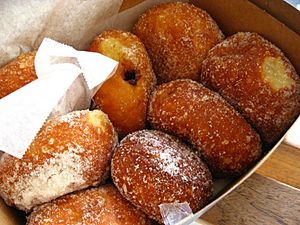Malasada facts for kids

|
|
| Type | Fried dough |
|---|---|
| Place of origin | Portugal |
| Region or state | Azores, Madeira |
| Main ingredients | Dough, sugar |
| Variations | Bola de Berlim (Berlin Ball) |
A malasada is a yummy treat from Portugal. It's a type of fried dough, a bit like a doughnut. Malasadas are made from small balls of dough. After they are fried, they are usually coated with sugar. Sometimes, cinnamon is added too!
The word "malasada" comes from Portuguese. It means "under-cooked." But don't worry, they are cooked perfectly! Traditional malasadas from Portugal don't have holes or fillings. But in places like Hawaii, you might find them with yummy fillings inside.
Malasadas are often eaten on a special day called Mardi Gras. This day is also known as "Fat Tuesday." It's the day before Lent begins. Lent is a time when some people give up certain foods or habits.
Contents
What is Malasada Day?
In the Azores and Madeira (parts of Portugal), malasadas are a big part of their Carnival celebrations. Carnival is a festive time before Lent. People made malasadas to use up all their lard (a type of fat) and sugar. They did this before Lent started, as these ingredients were often given up during that time.
This tradition traveled to Hawaii. In the 1800s, many Portuguese people moved to Hawaii. They went there to work on sugarcane farms. They brought their traditions with them, including making malasadas. In Hawaii, "Fat Tuesday" is now often called Malasada Day. It's a day to enjoy these delicious treats!
Malasadas in the United States
Many Portuguese families moved to the United States. They settled in places like Hawaii, Rhode Island, and Massachusetts. They brought their food traditions with them.
Malasadas in Hawaii
In 1878, Portuguese workers from Madeira and the Azores arrived in Hawaii. They came to work on the big farms. These immigrants shared their traditional foods, like malasadas. Today, you can find many bakeries in Hawaii that specialize in making malasadas. They are a very popular treat there!
Malasadas on the East Coast
On the East Coast of the U.S., there are also many Portuguese-American communities. You can find them in places like New Bedford and Fall River. During festivals in these towns, you can often find delicious Portuguese foods, including malasadas.
Making Malasadas at Home
In many Portuguese homes in the United States, malasadas are still made on Fat Tuesday. It's a special family tradition. Often, the older children help. They roll the warm, freshly fried malasadas in sugar. Meanwhile, the mother or grandmother cooks the dough. It's a fun way for families to celebrate and enjoy a sweet treat together!
See also
 In Spanish: Malasada para niños
In Spanish: Malasada para niños
 | Janet Taylor Pickett |
 | Synthia Saint James |
 | Howardena Pindell |
 | Faith Ringgold |

